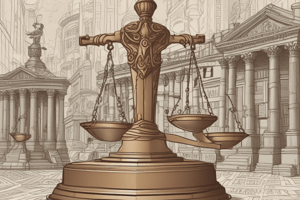Podcast
Questions and Answers
Which of the following is NOT a function of law at the macro level?
Which of the following is NOT a function of law at the macro level?
- Maintain the status quo
- Encourage absolute freedom without restrictions (correct)
- Protect minorities against majorities
- Promote social justice
What is one of the primary aims of a functioning legal system?
What is one of the primary aims of a functioning legal system?
- To restrict access to legal information
- To ensure only government officials understand the law
- To eliminate all forms of social change
- To preserve individual rights (correct)
Which school of legal thought primarily emphasizes the connection between law and morality?
Which school of legal thought primarily emphasizes the connection between law and morality?
- Positivism
- Critical legal studies
- Legal realism
- Natural law (correct)
In a democracy, how does law typically function?
In a democracy, how does law typically function?
What defines 'positive law' in the context of the United States?
What defines 'positive law' in the context of the United States?
What role does law play for businesses according to the content?
What role does law play for businesses according to the content?
Which entities are involved in making law in the United States?
Which entities are involved in making law in the United States?
What is the primary focus of legal positivism as described?
What is the primary focus of legal positivism as described?
Which school of thought contrasts with legal positivism?
Which school of thought contrasts with legal positivism?
How has the process of electing state judges been characterized in recent years?
How has the process of electing state judges been characterized in recent years?
Flashcards are hidden until you start studying
Study Notes
Understanding Law
- Law represents a set of binding rules of action or conduct created by a controlling authority, subject to legal consequences.
- Various meanings and functions of law have been contemplated by philosophers throughout history.
Functions of Law
- Macro functions include:
- Maintaining peace
- Preserving individual rights
- Protecting minorities against majorities
- Promoting social justice
- Allowing for orderly social change
- Law can also reinforce the status quo, potentially suppressing individual freedoms and minority rights.
- In democracies, law reflects societal aspirations, while authoritarian regimes use law to maintain power.
Law and Politics
- Lawmaking in the U.S. involves a coalition of legislators, judges, governors, and influences from corporations and NGOs.
- Increasing politicization in the election of state judges has seen campaign contributions align judges with specific political ideologies.
Schools of Legal Thought
- Jurisprudence encompasses various philosophies of law, with legal positivism and natural law being the most prominent.
- Legal positivism views law as a sovereign command, focusing on the assessment of existing statutes and regulations.
Legal Positivism
- An examination of statutes can provide a clear understanding of legal expectations and enforcement, as evidenced by traffic laws and their application in practice.
- Legal positivism emphasizes the importance of the written law in determining what constitutes "correct" legal behavior.
Studying That Suits You
Use AI to generate personalized quizzes and flashcards to suit your learning preferences.




